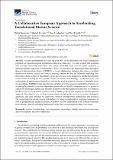Files in this item
A collaborative European approach to accelerating translational marine science
Item metadata
| dc.contributor.author | Brennecke, Philip | |
| dc.contributor.author | Ferrante, Maria | |
| dc.contributor.author | Johnston, Ian A. | |
| dc.contributor.author | Smith, David | |
| dc.date.accessioned | 2018-07-11T10:30:05Z | |
| dc.date.available | 2018-07-11T10:30:05Z | |
| dc.date.issued | 2018-07-05 | |
| dc.identifier | 254606271 | |
| dc.identifier | 4f2bc080-0016-44d8-818c-c3fd5f20c127 | |
| dc.identifier | 000445858900008 | |
| dc.identifier | 85065836602 | |
| dc.identifier.citation | Brennecke , P , Ferrante , M , Johnston , I A & Smith , D 2018 , ' A collaborative European approach to accelerating translational marine science ' , Journal of Marine Science and Engineering , vol. 6 , no. 3 , 81 . https://doi.org/10.3390/jmse6030081 | en |
| dc.identifier.issn | 2077-1312 | |
| dc.identifier.other | crossref: 10.3390/jmse6030081 | |
| dc.identifier.other | ORCID: /0000-0002-7796-5754/work/47136008 | |
| dc.identifier.uri | https://hdl.handle.net/10023/15236 | |
| dc.description | This research was funded by European Union’s Horizon 2020 research and innovation programme under grant agreement No 654008. | en |
| dc.description.abstract | Marine environments account for over 90% of the biosphere and hold tremendous potential for biotechnological applications and drug discovery. To fully exploit this potential and develop interesting discoveries into useful molecular tools and successful products, a multidisciplinary approach is indispensable. Here, we introduce the European Marine Biological Research Infrastructure Cluster (EMBRIC), a novel collaborative initiative that aims to facilitate translational marine science and remove existing bottlenecks that are currently impeding blue innovation. In the context of this initiative, pilot projects have been designed to test the functionality of the cluster focusing on two specific sectors of marine biotechnology: (i) the discovery and exploitation of marine natural products and (ii) the marker-assisted selection of desirable traits in aquaculture. EMBRIC brings together the expertise of six European Research Infrastructures on accessing the potential of marine organisms, specifically on the 99% of bacteria yet to be grown in culture, the microalgae, finfish, and shellfish. It improves the throughput and efficiency of workflows for discovery of novel marine products and facilitates projects that require an interdisciplinary approach. The objective is to develop coherent chains of high quality services for access to biological, analytical, and data resources by deploying common underpinning technologies and practices. The connection of academic science with industry is being strengthened by engaging companies, as well as geographically separated public and private-sector communities in the domain of marine biotechnology, and by federating technology transfer services amongst the players involved. | |
| dc.format.extent | 12 | |
| dc.format.extent | 1086716 | |
| dc.language.iso | eng | |
| dc.relation.ispartof | Journal of Marine Science and Engineering | en |
| dc.subject | Marine biotechnology | en |
| dc.subject | Microorganisms | en |
| dc.subject | Microalgae | en |
| dc.subject | Finfish | en |
| dc.subject | Research infrastructure | en |
| dc.subject | Discovery pipeline | en |
| dc.subject | Bioactive compounds | en |
| dc.subject | QH301 Biology | en |
| dc.subject | T-NDAS | en |
| dc.subject | SDG 14 - Life Below Water | en |
| dc.subject.lcc | QH301 | en |
| dc.title | A collaborative European approach to accelerating translational marine science | en |
| dc.type | Journal article | en |
| dc.contributor.sponsor | European Commission | en |
| dc.contributor.institution | University of St Andrews. Marine Alliance for Science & Technology Scotland | en |
| dc.contributor.institution | University of St Andrews. Scottish Oceans Institute | en |
| dc.contributor.institution | University of St Andrews. Centre for Research into Ecological & Environmental Modelling | en |
| dc.contributor.institution | University of St Andrews. School of Biology | en |
| dc.identifier.doi | 10.3390/jmse6030081 | |
| dc.description.status | Peer reviewed | en |
| dc.identifier.grantnumber | 654008 | en |
This item appears in the following Collection(s)
Items in the St Andrews Research Repository are protected by copyright, with all rights reserved, unless otherwise indicated.

